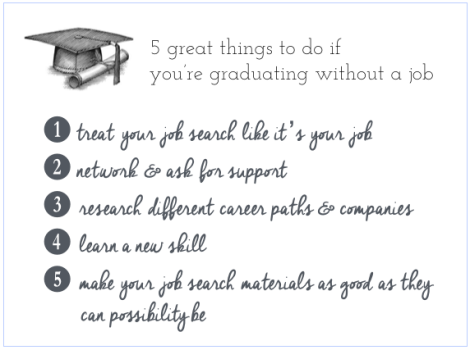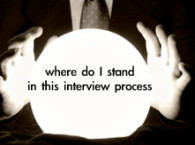About 7 years back, I graduated from NYU with a degree in Psychology but without a job in hand. I had a few good ideas about what I wanted to do with my life, but didn’t feel very close to getting there. It took about 3 months for me to land my job offer on the recruiting team at J.P. Morgan. When I look back now, I can see with total clarity the things that I did right, and the things I should have done differently.
Looking back on that experience plus what I know now after 7 years working in HR/Recruiting, I’d like to share the 5 things you should be doing if you’re graduating without a job:

1. Treating your job search like a job
Finding a job is your job right now and your success depends on how you approach the process. Aimlessly searching for roles on your phone as you multitask on Instagram isn’t going to do the trick. Put structure and goals around each day that relate to your job search. Perhaps 9-10am each day is reserved for looking for jobs online and 10-11am is reserved for submitting an application.
You should have concrete goals related to the amount of applications you want to submit per day, how many networking events you want to attend each week, and be strategic about those you’d like to ask for referrals or informational interviews. This will keep you on track and focused.
I think the commit app could be a fun way to track these goals.
2. Networking and asking for support
In many ways, entry level jobs can be the hardest to get. There are so many candidates out there with similar backgrounds and it’s tough to differentiate yourself before you have full time work experience (though of course internships, education, and skills are key differentiators).
More than any other time in your career, this is an important moment to ask for support. Think of those you know (family members, friends, those a few years ahead of you in your sorority or fraternity) and see if any of them work at (or are connected to someone who works at) a company you’re interested in.
Making one of these key connections and asking (nicely!) for a referral is what ultimately helped me land my first job.
3. Researching different career paths
A lot of people are open to doing different things but you don’t want to come across as “too open” or desperate. The best candidates I’ve interviewed have known the type of work they’d like to do and why they were qualified to do it.
Graduating without a job gives you the luxury to do really thorough research on different industries and different entry level jobs. Reading the right websites, magazines, books, and talking to people who are knowledgable about certain industries, can save you years of being in the wrong profession. The truth is… some skills are transferable, but switching career paths can be really hard… and chances are if you choose the wrong one, and want to make a shift 3 years later, you will be taking a pay cut, and in many cases will need to “start over”.
4. Learning new skills
This was the biggest miss for me by far… and now I see how critical it is. When you’re applying for entry level jobs it’s going to be competitive and becoming more proficient in a relevant skill could be the thing that ultimately lands you the job over another candidate.
Even brushing up on basic Microsoft office programs (powerpoint, excel) can end up making a huge difference. There are tons of classes out there (and plenty of free online training courses) that will teach you about almost any program.
When you get asked “Do you have experience with X” in an interview I can guarantee you’d rather say “I actually just took a class on that since I wasn’t required to use it much in school/in past internships and now I’m proficient in X”.
5. Making your application materials as good as they can be
Last but not least is the most obvious thing you’ll want to do which is to look at your resume, cover letter template, portfolio materials (if relevant) and anything else that is part of your application. Use this extra time to make sure everything is as good as it can possibly be.
I always found it helpful to have a few friends or family members look over my materials and give feedback. If you’d like more support on this one, definitely check out my services as well. I’ve worked with many clients to help them get their first jobs and would love to work with you too!
Did you graduate without a job? What tricks and tips did you use? Would love to hear in the comments.
header image via Bakerella





